Charlotte King and Fransiska Louwagie discuss the research collaborations that have informed a new education programme to help secondary students to make sense of their pandemic experiences through political cartooning. Blog written in collaboration with Sarah Weidman, Lucie Spicer and the broader Covid in Cartoons team and partners.
The Covid in Cartoons team have worked with partners ShoutOutUK and Cartooning for Peace to develop a dynamic and engaging minicourse for secondary schools, using the medium of political cartoons to focus on youth experiences during the COVID-19 pandemic.
The course includes participatory learning with professional cartoonists that helps young people make meaning from their pandemic experience, and better understand the wider contexts in which that situates. In doing so, it aims to build their criticality, sense of agency and belonging, and supports resilience pathways. These foci are of particular significance as the pandemic poses specific challenges for young people – particularly those in seldom-heard and/or under-represented groups – who may feel especially disempowered.
The project allows the research team to uncover and examine individual and collective narratives of the COVID-19 pandemic to elucidate how young people make meaning of their situation. It investigates how the pandemic has affected both their sense of identity and their outlook on the future. As political cartoons provide students with tools that encourage self-reflection and freedom of expression, they were chosen as a tool and medium to engage young people in building a critical narrative of the crisis and its impact. Throughout the project, students develop tools to decipher and articulate the implications of political environments and the differential impact it has on varied demographics.
Closely aligned to the UK-focused AHRC-project was an GCRF (Research England)-funded short-term project on Political Cartooning and Peace-Building in Conflict and Post-Conflict Contexts, that has seen political cartooning workshops happening with young people in Côte d’Ivoire, South Africa, and Kenya . This short-term project amplified the aims of the AHRC-project by centralising seldom-heard voices from across the globe. An initial LIAS Working Paper captured some of the findings and discussion from this initiative.
To showcase the outcomes of these projects to the public, support was obtained from the University of Leicester’s ESRC IAA funds (Pi Dr Fransiska Louwagie; Co-Is Kara Blackmore and Sarah Weidman, research associates on the Covid in Cartoons project) to organise an arts-based and youth-led event at the Forum for Global Challenges at the ICC in Birmingham from 3 to 5 May. The Forum for Global Challenges was an international meeting taking place in conjunction with the Birmingham 2022 Commonwealth Games. It aimed to “generate solutions to some of the most pressing challenges faced by our planet and its people, from climate change and destruction of the natural world, to rising inequality, especially exacerbated by climate change and the global pandemic”. With further support from the School of Arts and the Leicester Institute for Advanced Studies at the University of Leicester, as well as from the University of Birmingham as organiser of the Forum, we were able to put on a unique set of events, involving the participation of young people, artists, media specialists from Shout Out UK and international cartoonists from Cartooning for Peace.
As part of the Forum strand on Education and Employability (led by Prof. Peter Kraftl from the University of Birmingham), the Covid in Cartoons team held a roundtable with young people from Sirius Academy Hull, with an interactive discussion led by Lucie Spicer from Shout Out UK, and cartoonist Tayo. Cartoons created by young people as part of the project were utilised to galvanise discussion surrounding the theme of global challenges and creative solutions. Other project partners, including from a GCRF-funded project on political cartooning with the University of Nairobi, offered responses throughout the hybrid session to ensure a transnational perspective. The roundtable event provided a poignant platform whereby young people developed ownership over their perspectives, and confidence in the summation of the analytical skills acquired over the past year. This experience illuminated the importance of empowering young people to consider future possibilities otherwise repudiated.
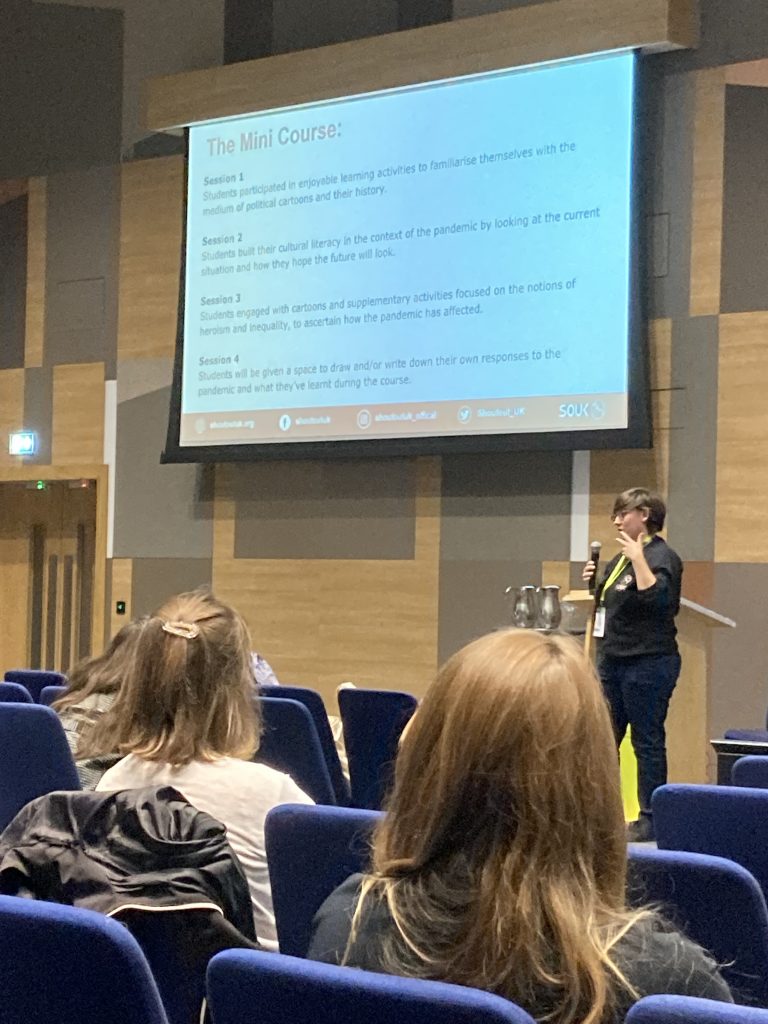
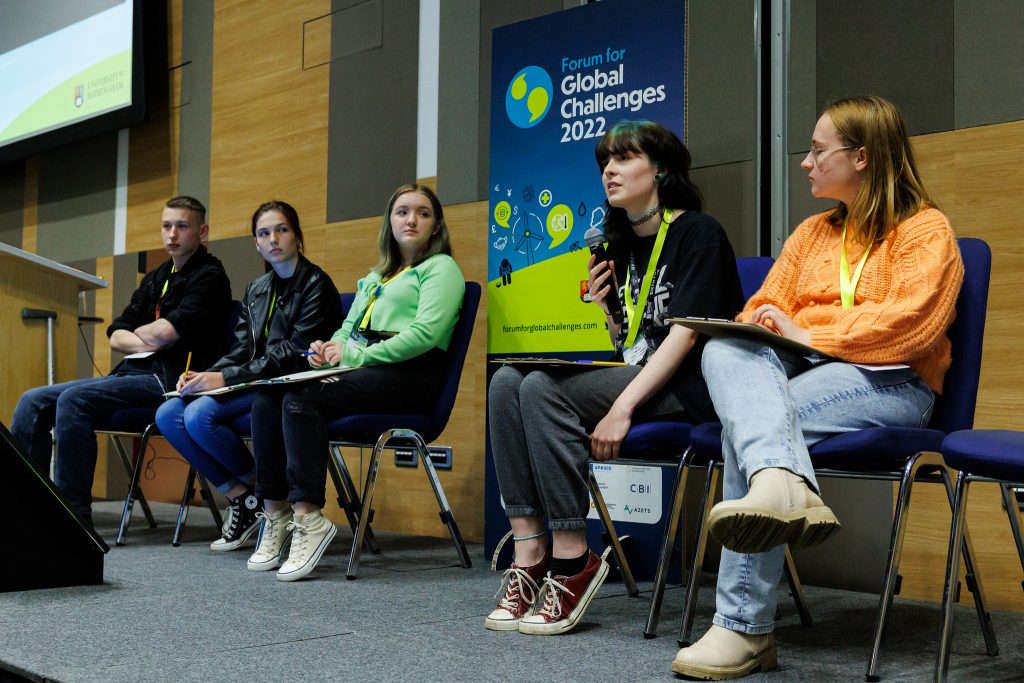
Cartoonist Tayo, who has lived both in the UK and Nigeria, congratulated the young people present on their drawings during a cartooning tutorial, reminding them of the famous statement by Nelson Mandela that “Education is the most powerful weapon you can use to change the world”. As young people discussed how they had felt overwhelmed by online information and teaching during lockdowns, and how the COVD-19 pandemic has put their lives and development on hold for a significant amount of time, this was a powerful encouragement.
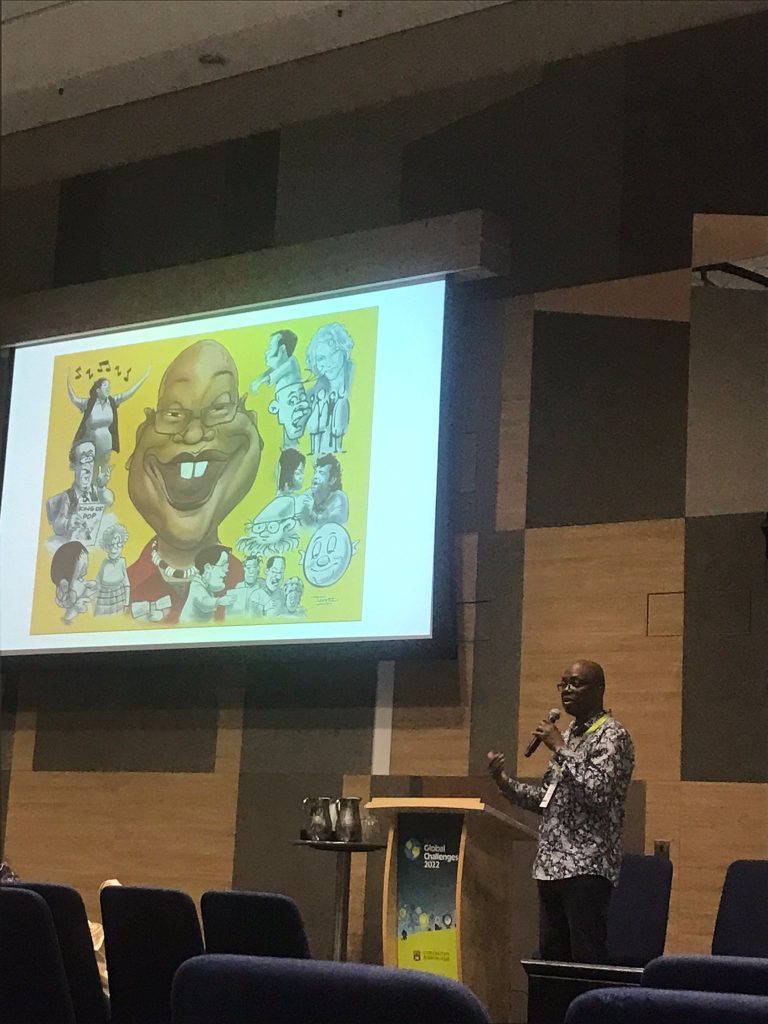
Discussions during the roundtable were captured via live-drawing by cartoonist Piet, also from the Cartooning for Peace network, who used humour and metaphors to express the challenges of the COVID-19 era for young people.
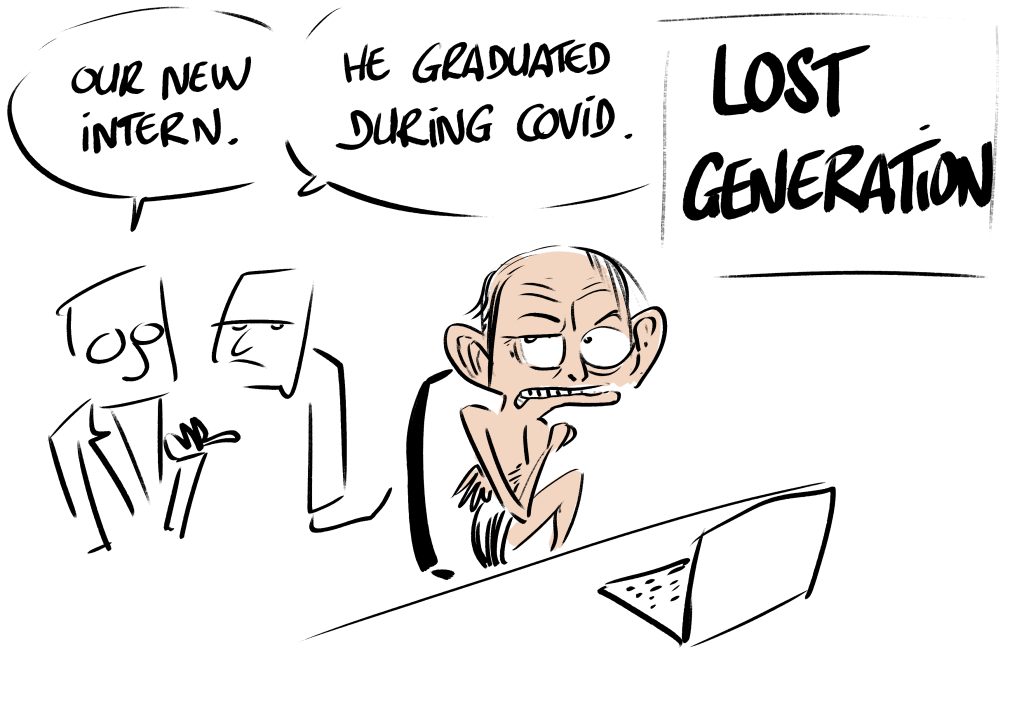
Alongside the roundtable, the Covid in Cartoons team exhibited a project-based art installation over the 3 days of the event. In partnership with Vehicle Arts, an organisation that promotes emerging artists, mixed-media artist Rebecca Harvey-Hobbs developed an installation dedicated to both the AHRC- and GCRF-funded projects.

As the basis for the display, the artist visually transformed outputs from the project participants in an installation comprised of 3D interactive elements. These were displayed alongside a digital showreel of participant drawings, to give visitors a range of insights into young people’s perspectives.

Alongside access to young people’s (anonoymised) cartoons created throughout the course, visitors were encouraged to engage in activities, such as a social media campaign with visual depictions of individual experiences of the pandemic represented on masks and feedback cards indicating the level of insight gained. Indeed, artist Rebecca Harvey-Hobbs emphasises the importance of public engagement as “varying methods of communication leads to greater depth of understanding [and] inspires new interest”. Across the 3 days, the installation attracted a diverse audience of visitors and policy makers from areas including; public health, puppeteering, engineering, political science, pedagogy, media literacy, sexual health, and representatives from AHRC and UKRDC. Additionally, visitors felt inspired to talk openly about their experiences of the pandemic, and the ways in which it affected their lives.
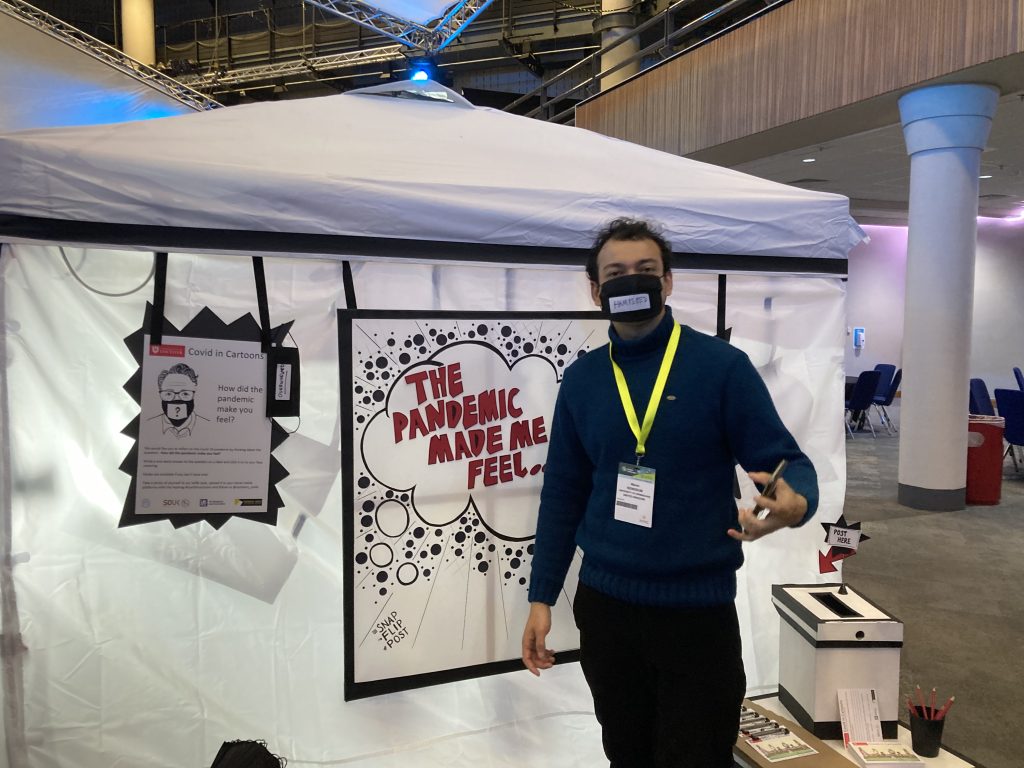
The visitor responses gathered via the feedback postcards showed a shared appreciation for the inclusion of the international workshops based in South Africa, Kenya and Côte d’Ivoire. 93% (N=15) of people who completed this question felt the installation helped to gain new insights into young people’s perspectives of the pandemic ‘a great deal’ or ‘quite a bit’. The open feedback sections on the postcards demonstrated that visitors appreciated the creative and interdisciplinary aspect of the project. One read; “… a great example of collaborative work between partners in a novel medium that frees expression through creativity and mindfulness”.Additionally, a main take-away surrounded the need to include young people’s perspectives. One stated “Listen to young people! We always forget about their voices”. A shared observation across the forum feedback was the need to discuss future implications of the pandemic – an outcome which spoke to the aims of the exhibition as well as justifying the trajectory of the research.
Following the forum, the art installation has been presented at the Pint of Science festival in Leicester, by PI Fransiska Louwagie and artist Rebecca Harvey-Hobbs. It will also be showcased at a policy event at the Cartoon Museum in London on 21 June. These events also an avant-première of the Covid in Cartoons end-of-project film, produced by Shout Out UK. This amazing short film, produced by Shout Out UK, is now available for viewing here.
Thanks and Acknowledgements. The Covid in Cartoons research team comprises Dr Fransiska Louwagie (PI), Dr Diane Levine (Co-I), Dr Kara Blackmore and Dr Sarah Weidman (Research Associates). We gratefully acknowledge funding for these projects from the Arts and Humanities Research Council, the Global Challenges Research Fund (Research England) and the University of Leicester’s ESRC IAA Fund.


